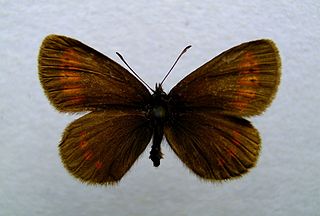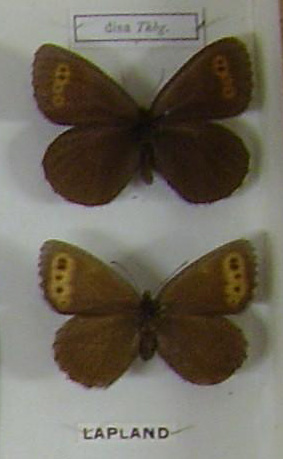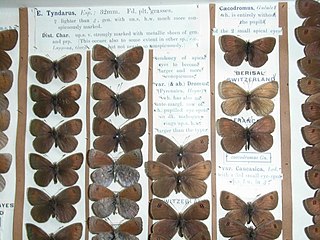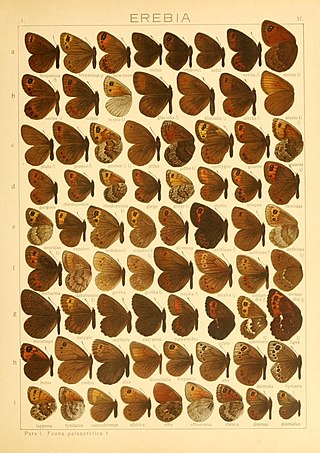
The small mountain ringlet or mountain ringlet is a butterfly of the family Nymphalidae. It is found in mountainous regions of southern and central Europe.

Percnodaimon merula, the black mountain ringlet, is a satyrid butterfly in the family Nymphalidae. It is currently the only recognised species in the monotypic genus Percnodaimon, endemic to New Zealand, although there may be other undescribed species in the genus. The black mountain ringlet is notable for living exclusively in rocky areas of New Zealand's Southern Alps, usually above 1200 m. Its eggs are laid on rocks, its larvae feed on mountain Poa species, and it pupates under a stone. It has distinctive dark velvety wings and a zig-zag flight pattern over the scree slopes on which it lives.

The Raetzer's ringlet is a species of butterfly in the family Nymphalidae. It is found in Italy and Switzerland. Its natural habitat is temperate grassland. It is one of the rarest European butterflies, having not more than six or seven populations.

Erebia is a Holarctic genus of brush-footed butterflies, family Nymphalidae. Most of the about 90–100 species are dark brown or black in color, with reddish-brown to orange or more rarely yellowish wing blotches or bands. These usually bear black spots within, which sometimes have white center spots.

Erebia epistygne, the spring ringlet, is a species of butterfly in the family Nymphalidae. It is found in France and Spain. Its natural habitat is temperate grassland.

The Sudeten ringlet is a species of butterfly in the family Nymphalidae. It is found in Czech Republic, Poland, Romania, France, and Switzerland. Its natural habitat is temperate grassland. It is threatened by habitat loss.

Erebia alberganus, the almond ringlet or almond-eyed ringlet, is a butterfly of the family Nymphalidae.

Erebia ligea, the Arran brown, is a member of the subfamily Satyrinae of the family Nymphalidae. This brown is widespread in south-eastern and northern Europe. It prefers mixed woodlands at low altitudes. It is rarely seen in open areas. This species was first described by Carl Linnaeus in his 1758 10th edition of Systema Naturae, and the type locality is Sweden.

Erebia tyndarus, the Swiss brassy ringlet, is a European brush-footed butterfly species of the subfamily Satyrinae.

The Arctic ringlet or Disa alpine is a member of the subfamily Satyrinae of family Nymphalidae. It is associated with wet muskeg and bogs in subarctic and Arctic climates, and is often found near the tree-line. The larva overwinters twice before undergoing metamorphosis into an adult. It is found in Arctic Europe, Arctic European Russia, Sajan, Irkutsk, Yakutsk, Yablonoi and Arctic North America.

The marbled ringlet is a member of the subfamily Satyrinae of the family Nymphalidae.

The brassy ringlets are a species group of ringlet butterflies in the genus Erebia. Though closely related, their monophyly is not completely resolved. Still, the brassy ringlets are taxa similar to E. tyndarus – the Swiss brassy ringlet –, and in many cases certainly close relatives. A notable trait of their genus is an ability to adapt well to cold and somewhat arid habitat, like taiga or regions with alpine climate. Optimal habitat in Eurasia, where most of the brassy ringlets are found, therefore occurs in two distinct belts – in the very north of the continent and in the Alpide belt – in interglacials, and in glacials in one periglacialic belt at lower altitude, in places interrupted by dry wasteland and deserts.

Erebia nivalis, or de Lesse's brassy ringlet, is a member of the subfamily Satyrinae of the family Nymphalidae. It is found throughout the Alps of southern Austria with a remote population in central Switzerland.

Erebia cassioides, the common brassy ringlet, is a member of the subfamily Satyrinae of family Nymphalidae.

Erebia callias, the Colorado alpine, is a member of the Satyridae subfamily of the Nymphalidae butterflies. It is found in alpine areas of Wyoming and Colorado in the U.S. Rocky Mountains as well as various mountain ranges in eastern Asia.
Erebia polaris, the Arctic woodland ringlet, is a butterfly of the family Nymphalidae. It is found in Lapland and boreal Asia.

Erebia hispania, the Spanish brassy ringlet, is a species of butterfly of the family Nymphalidae, endemic to the Sierra Nevada of southern Spain. The taxon rondoui, previously considered as a subspecies of Erebia hispania, is considered now as a different species according to the results obtained in molecular studies.

Erebia ottomana is a small butterfly found in the East Palearctic that belongs to the browns family.


















